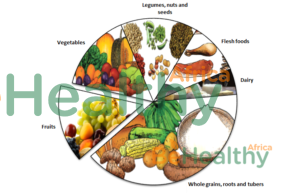
A lot of people ask me this question, “what should I eat?” Interestingly, while a lot of people are concerned about their health and nutrition, many do not want to spend time thinking or planning what to eat. . Today, I am focusing on what you should eat every day.
You should eat a healthy diet every day. What is a healthy diet?
A healthy diet is one that will give you nutritious and safe foods in adequate amount and variety to meet your energy and nutrient needs. It should give you protection against malnutrition in all its forms (stunting, wasting, obesity, micronutrient deficiency) and non-communicable diseases like diabetes, heart diseases and cancer.
Here are the basic principles that you just have to keep in mind when planning or buying your meals.
- Quantity
Your meals should contain adequate energy to meet your needs. When you eat too much of certain food components like carbohydrates, fats, sugar, salt, etc they have negative outcome on your body and health and on the long term can cause disability and death. Likewise, when you do not eat enough of some food components like fruits, vegetables and legumes, you do not get enough of all micronutrients and fibre needed for your bodily functions and it can lead to illnesses and even death.
- Quality
When picking or planning your meals, you need to be careful of foods that are empty of nutrients – especially overly processed foods. Some of these are also packed with numerous additives, trans fats, salt and sugar. On the other hand, when some are not well processed, they might still contain their natural anti-nutrients that stop you from getting the nutrients that are in the foods. Go for foods that are as natural as possible or less processed.
- Diversity
Diversity is something I have written a lot about in the past. Eating a variety of nutrient-dense foods is important. You shouldn’t just eat rice every day, if you do, you would miss out on many important nutrients that are found in other foods. Also, many nutrients work in synergy with each other so if you are deficient in one, it can affect the way your body processes the other. I would elaborate in another post.
You should eat from the following food groups: Whole grains, roots and tubers; legumes, nuts and seeds, fruits and vegetables (especially the yellow, red and dark green-coloured ones which are rich in Vitamin A) and Flesh foods (meat, fish, egg) and dairy foods.

This food guide is somewhat representative of the Nigerian plate. Note that this differs from the American my plate and it should because our nutritional needs are quite different from theirs. So, the US ‘my plate’ is not what we should plan our nutrition by.
Also, we typically do not consume fruits while eating so the fruit portion has been sliced off the plate but it is still a part of a healthy meal. I will elaborate on this in another post.
- Safe
This one is super important. How safe are the foods that you eat? Be careful of contaminants, pesticides, and microbes that can damage your body and health. These days, we need to be careful that the foods we eat are not making us sick.
In a nutshell
The Answer to the question, “what should I eat?” is a healthy diet. What does a healthy diet (plate) in Nigeria look like? See the picture above. The principles of a healthy diet – quantity, quality, diversity and safe – should be your watch words when you want to decide on what to eat and how you eat. I will follow this post with another explaining the food guide further. I encourage you today to eat better and live better.
P.s: This food guide ‘my plate’ is not developed by the Federal Ministry of Health. It is just a rough graphical representation of what our healthy Nigerian plate should look like and there are no measurements here for now (e.g. eat 5 portions/400g of fruits and vegetables per day). There is currently no updated Food based dietary guidelines with a food guide in Nigeria to provide this information and once it is developed I will communicate this to you.
Notes:
Reference on healthy diet is from WHO fact sheets about healthy diet : https://www.who.int/news-room/fact-sheets/detail/healthy-diet
Food pictures from the Nigerian Counselling cards: https://www.spring-nutrition.org/publications/training-materials/nigeria-community-and-facility-infant-and-young-child-feeding


